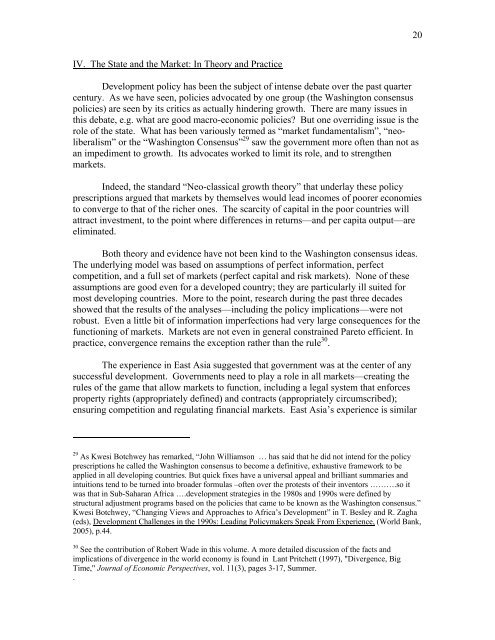Paper - Initiative for Policy Dialogue
Paper - Initiative for Policy Dialogue
Paper - Initiative for Policy Dialogue
You also want an ePaper? Increase the reach of your titles
YUMPU automatically turns print PDFs into web optimized ePapers that Google loves.
20<br />
IV. The State and the Market: In Theory and Practice<br />
Development policy has been the subject of intense debate over the past quarter<br />
century. As we have seen, policies advocated by one group (the Washington consensus<br />
policies) are seen by its critics as actually hindering growth. There are many issues in<br />
this debate, e.g. what are good macro-economic policies But one overriding issue is the<br />
role of the state. What has been variously termed as “market fundamentalism”, “neoliberalism”<br />
or the “Washington Consensus” 29 saw the government more often than not as<br />
an impediment to growth. Its advocates worked to limit its role, and to strengthen<br />
markets.<br />
Indeed, the standard “Neo-classical growth theory” that underlay these policy<br />
prescriptions argued that markets by themselves would lead incomes of poorer economies<br />
to converge to that of the richer ones. The scarcity of capital in the poor countries will<br />
attract investment, to the point where differences in returns—and per capita output—are<br />
eliminated.<br />
Both theory and evidence have not been kind to the Washington consensus ideas.<br />
The underlying model was based on assumptions of perfect in<strong>for</strong>mation, perfect<br />
competition, and a full set of markets (perfect capital and risk markets). None of these<br />
assumptions are good even <strong>for</strong> a developed country; they are particularly ill suited <strong>for</strong><br />
most developing countries. More to the point, research during the past three decades<br />
showed that the results of the analyses—including the policy implications—were not<br />
robust. Even a little bit of in<strong>for</strong>mation imperfections had very large consequences <strong>for</strong> the<br />
functioning of markets. Markets are not even in general constrained Pareto efficient. In<br />
practice, convergence remains the exception rather than the rule 30 .<br />
The experience in East Asia suggested that government was at the center of any<br />
successful development. Governments need to play a role in all markets—creating the<br />
rules of the game that allow markets to function, including a legal system that en<strong>for</strong>ces<br />
property rights (appropriately defined) and contracts (appropriately circumscribed);<br />
ensuring competition and regulating financial markets. East Asia’s experience is similar<br />
29 As Kwesi Botchwey has remarked, “John Williamson … has said that he did not intend <strong>for</strong> the policy<br />
prescriptions he called the Washington consensus to become a definitive, exhaustive framework to be<br />
applied in all developing countries. But quick fixes have a universal appeal and brilliant summaries and<br />
intuitions tend to be turned into broader <strong>for</strong>mulas –often over the protests of their inventors ……….so it<br />
was that in Sub-Saharan Africa ….development strategies in the 1980s and 1990s were defined by<br />
structural adjustment programs based on the policies that came to be known as the Washington consensus.”<br />
Kwesi Botchwey, “Changing Views and Approaches to Africa’s Development” in T. Besley and R. Zagha<br />
(eds), Development Challenges in the 1990s: Leading <strong>Policy</strong>makers Speak From Experience, (World Bank,<br />
2005), p.44.<br />
30 See the contribution of Robert Wade in this volume. A more detailed discussion of the facts and<br />
implications of divergence in the world economy is found in Lant Pritchett (1997), "Divergence, Big<br />
Time," Journal of Economic Perspectives, vol. 11(3), pages 3-17, Summer.<br />
.














